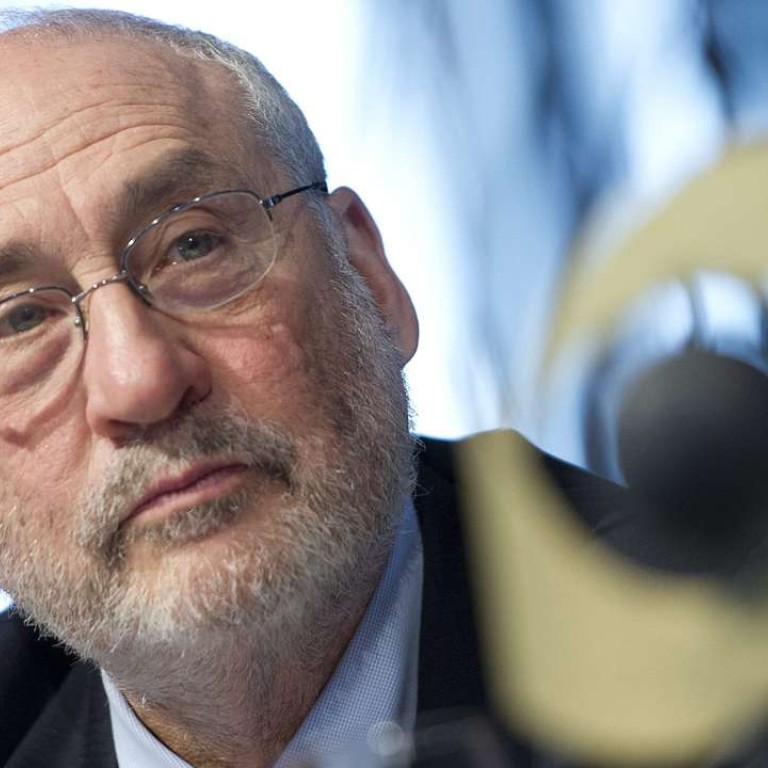
Economist Stiglitz warns of winners and losers as Asia pursues greater economic integration
Nobel laureate says region must provide assistance to those who stand to lose from the increasing number of trade agreements
Nobel laureate and former World Bank chief economist Joseph Stiglitz has warned there will be winners and losers as Asia plunges headlong into an increasing number of trade agreements and economic integration programmes that connect the diverse and disparate economies of the region.
As countries pursue more such trade agreements, Stiglitz said policymakers should create trade assistance programmes to address the needs of those that stand to lose out, or Asia could repeat the US experience where economic losers banded together to become a substantial antiglobalisation political force.
Like the North American Free Trade Agreement (NAFTA) or the European Economic Community before it, Asian nations are currently in the throes of pursuing greater economic and financial integration - albeit without political or monetary union - through the Asean Economic Community framework, as well as the Regional Comprehensive Economic Partnership (RCEP) agreement.
When completed, proponents of RCEP say it will be the largest trade bloc in the world, covering some 45 per cent of the global population and accounting for a third of all economic output in terms of gross domestic product (GDP).
“One of the things we have learned is that even if trade agreements make participating countries better off, it doesn’t mean every citizen in the countries will be better off,” said Stiglitz. “Even if its the case of globalisation or trade agreements make the US as a whole better off, there are winners and losers.”
In Europe’s model of economic integration, Stiglitz’s research strongly distinguishes between growth of national GDP and GDP per capita. He concluded that poor policy design, together with the lack of unifying political institutions, particularly since the introduction of the euro, had led to more inequality and greater divergence in economic performance across the continent.
Even if trade agreements make participating countries better off, it doesn’t mean every citizen in the countries will be better off
In a thesis titled The Euro: How a Common Currency Threatens the Future of Europe, released last month, he showed that after inflation adjustments, the euro zone’s economic performance has stagnated since the formation of the common currency, adding that the result was the opposite of what the euro founders had in mind.
Likewise, in Asia, as the region moves ahead with economic integration, Stiglitz said there will inevitably be workers in richer Asian countries who stand to lose out to those from poorer neighbours.
“In the richer countries, in the [lower skilled] grouping, people will become worse off. What is the right answer? You have to have trade assistance to those whose incomes are going down. This is a particular problem when the economy doesn’t have full employment,” Sitglitz added. While standard university-taught economic theory says trading of goods may benefit both parties, it also assumes winners would compensate losers. “It doesn’t say they would compensate the losers. That’s a political process,” said Stiglitz.
“One of the big mistakes was the opposition in the United States by one of the political parties to any form of trade assistance [to workers who lost out]. If you start having enough of these losers, they generate a political force and start to resent globalisation. That’s one of the big lessons from the US experience.”
On the sidelines of Monday’s CLSA Investors Forum, Stiglitz told the Post that Asian countries should allocate part of their receipts from increasing trade to support the workers who lose out. “Those who lose their job should have assistance. You need one way or another to help those who are going to be hurt. It has to be financed some way,” he said.
Stiglitz’s theory of globalisation – which he characterised as a case of greater economic integration – could lead to more inequality and thereby greater economic instability and slower actual growth when done with poor policy choices, an approach that in recent years has gained mainstream acceptance.
The phenomenon has led to what he described as “the evisceration of the middle class” and “global discontent with globalisation”.
Stiglitz said the working class are right when they believe they have not shared in the fruits of the global economy. “Trickle down economics doesn’t work. The bottom 90 per cent has essentially seen stagnant incomes. The vast majority has not shared the prosperity. Today, [inflation-adjusted] middle income in the US is the same as 40 years ago.”
The IMF recently warned countries about such an economic divergence. In a strategy paper released last year it said: “Income inequality matters for growth and its sustainability. Our analysis suggests that the income distribution itself matters for growth as well. Specifically, if the income share of the top 20 per cent (the rich) increases, then GDP growth actually declines over the medium term, suggesting that the benefits do not trickle down.
“In contrast, an increase in the income share of the bottom 20 per cent (the poor) is associated with
higher GDP growth. The poor and the middle class matter the most for growth via a number of interrelated economic, social, and political channels,” the IMF report said.

